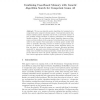Free Online Productivity Tools
i2Speak
i2Symbol
i2OCR
iTex2Img
iWeb2Print
iWeb2Shot
i2Type
iPdf2Split
iPdf2Merge
i2Bopomofo
i2Arabic
i2Style
i2Image
i2PDF
iLatex2Rtf
Sci2ools
113
click to vote
ICCBR
2005
Springer
2005
Springer
Combining Case-Based Memory with Genetic Algorithm Search for Competent Game AI
We use case-injected genetic algorithms for learning how to competently play computer strategy games. Case-injected genetic algorithms combine genetic algorithm search with a case-based memory of past problem solving attempts to improve performance on subsequent similar problems. The case-injected genetic algorithm improves performance on later problems in the sequence by learning from cases recorded earlier in the sequence. Since game-play in strategy games usually boils down to optimally allocating resources to achieve in-game mission objectives, we describe how a case-injected genetic algorithm player can play our game by solving the sequence of resource allocation problems generated by opponent moves during game-play. When retrieving and using cases recorded from human game-play, results show that case injection effectively biases the genetic algorithm toward producing plans that contain appropriate elements of plans produced by human players.
| Added | 27 Jun 2010 |
| Updated | 27 Jun 2010 |
| Type | Conference |
| Year | 2005 |
| Where | ICCBR |
| Authors | Sushil J. Louis, Chris Miles |
Comments (0)

